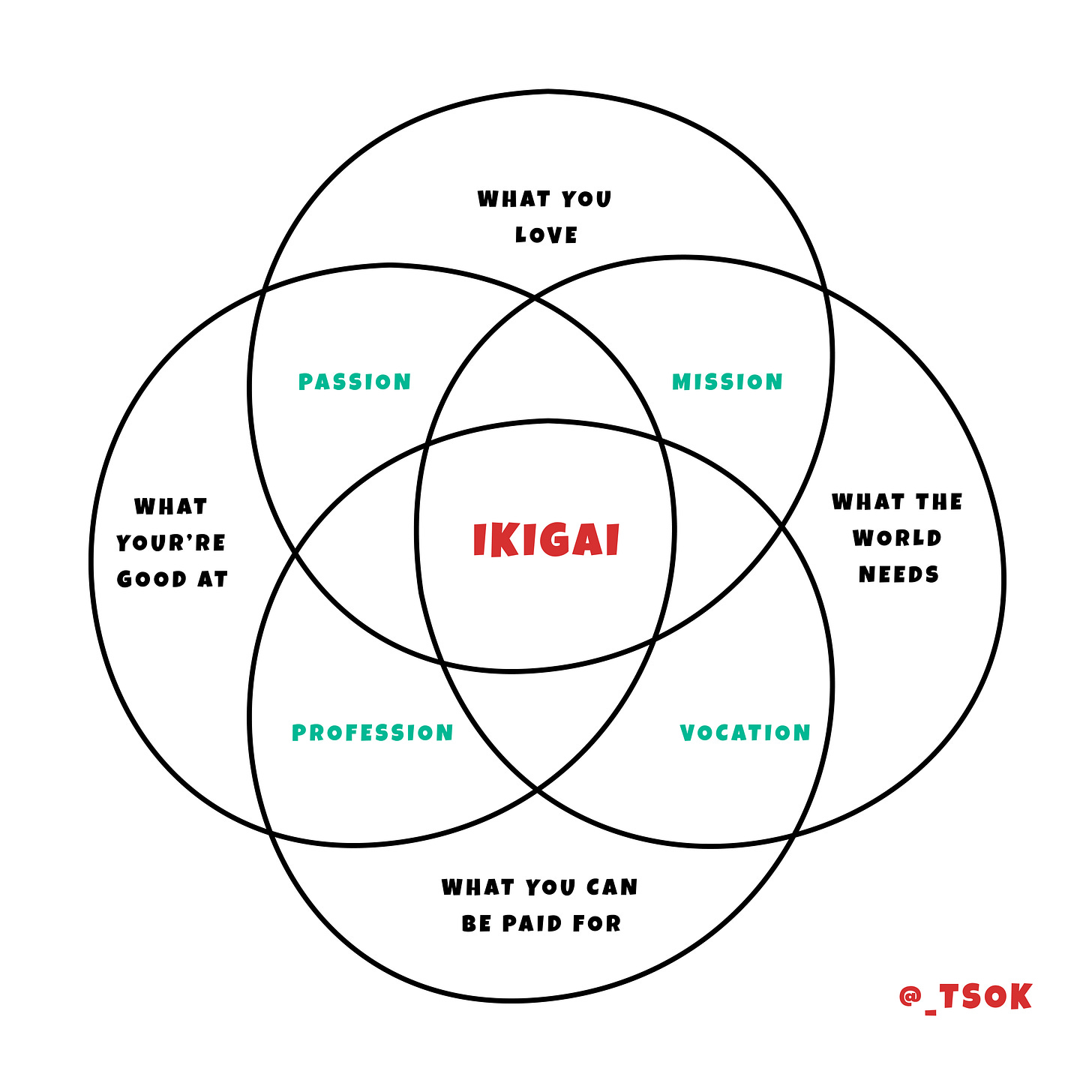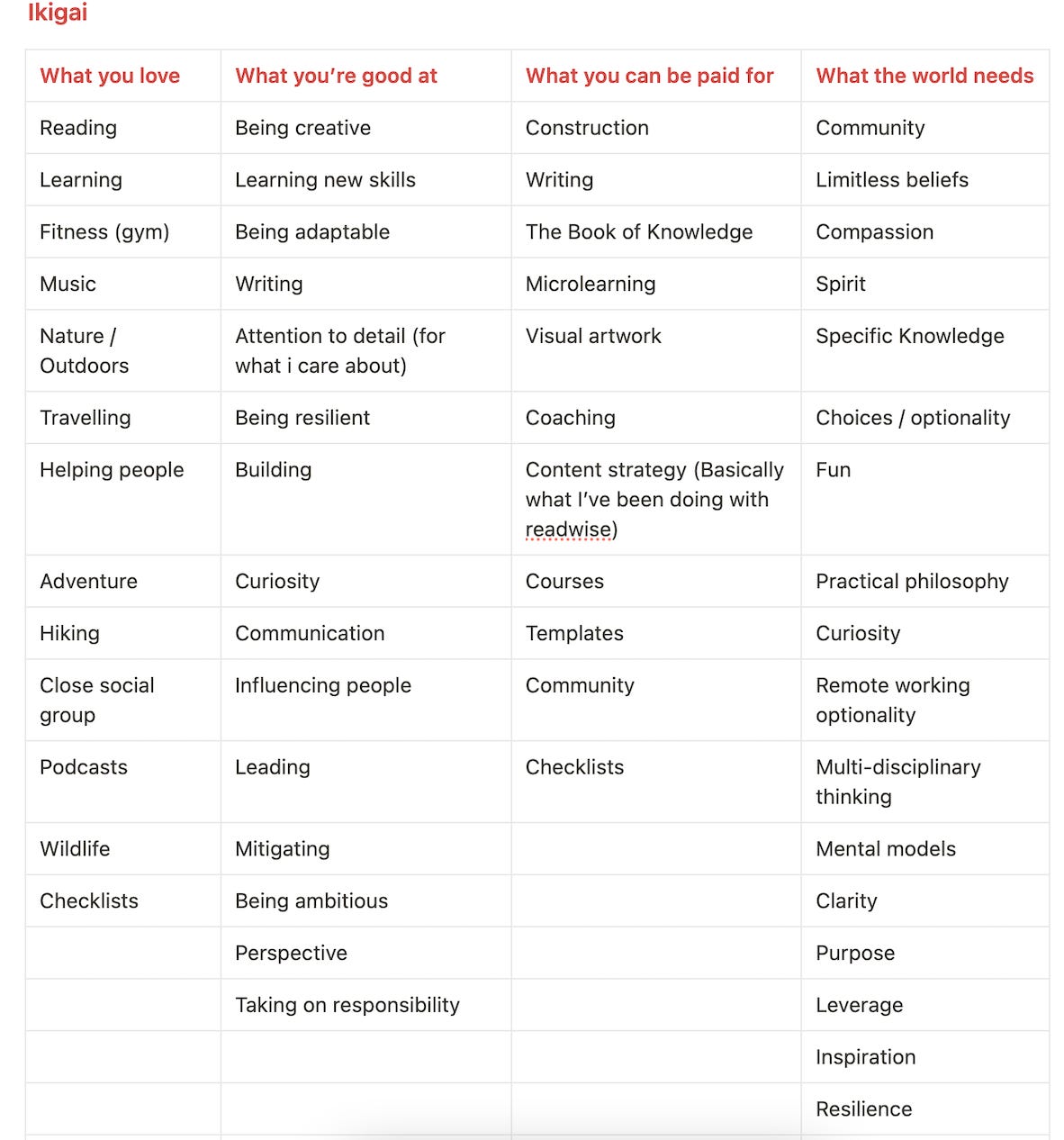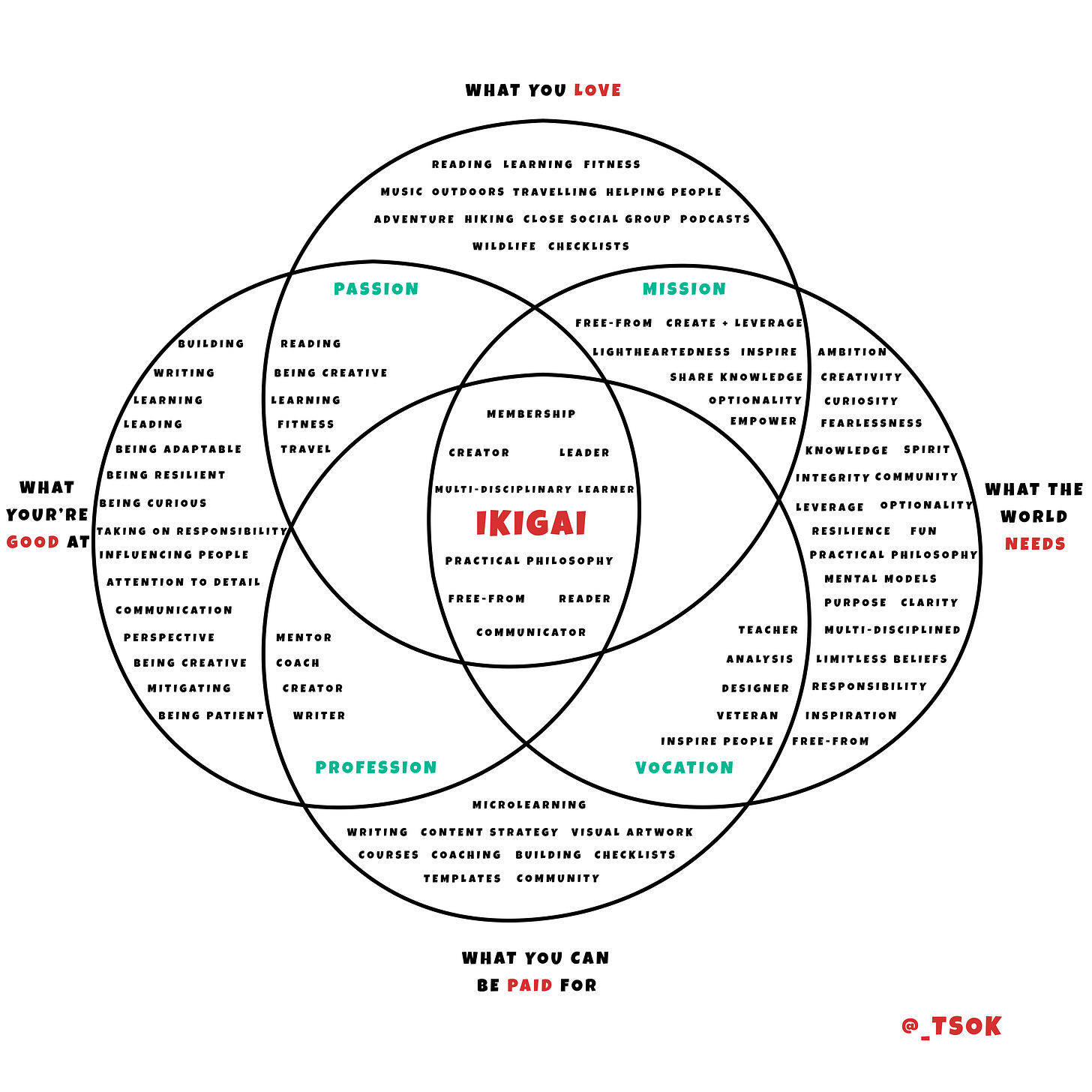There are two types of people in this world:
Those who have their sh*t together &
Those who don’t…
Or so it may seem.
It's frustrating to see others fulfil their potential while we feel lost and stuck. Especially more so when we’re really trying to change or want something so badly.
When we hit this critical junction, we’re left with two unsatisfactory choices:
Continue to swim upstream on a prayer that what we’re doing will work itself out, or
Give up. Positive change, dreams, and happiness aren’t for us.
I don’t like either of those choices, and I'm here to share with you my easy 3-step process for finding purpose. Finding your purpose in life is crucial to living a happy and fulfilling life. It not only gets you out of bed in the morning but is something you look forward to. When you find your purpose(s) in life, life no longer feels like an obligation. It’s a game you play.
This week I've read Ikigai, The Japanese Secret to a Long and Happy Life, where the authors discuss the importance of finding your Ikigai.
Ikigai is a blend of two Japanese words: “iki” meaning “to live” and "gai" meaning “reason.” This translates in English to “a reason to live.”
This week I break down the 3 step process for finding your ikigai:
What is "Ikigai"?
The diagram above wasn’t in the book but has been adopted by Westerners (obviously) to help people find their purpose (Ikigai).
Ikigai focuses on self-reflection. It helps you find your interests. By knowing what you love, what you're good at, what the world needs, and what you can be paid for, you can get a good idea of your interests. These are broad and usually highly competitive areas such as (health or business).
Inbound of them is your mission, vocation, profession, and passion. These are less competitive and offer some individuality; for example, coaching.
Overlapping them all in the centre is your Ikigai and is unique to you. You should seek out positive-sum games in this location and strive to pursue them.
You don’t have to live the life you’re living now. Find your purpose and start to live a more fulfilled and happy life.
Below are practical steps to help you with this.
So, grab a pen and some paper, or like me, open up something (I used Notion) where you can create a couple of tables, and let’s get started.
1. How to Find Your Ikigai
To find your Ikigai, you need to write down a thing, or many, for each of the broad (outer) and defined (inner) categories. For example, the ‘what you love’ section could be:
Helping people
Learning
Adventure
Running
Art
For what the world needs, you could put:
Compassion
Community
Curiosity
Knowledge
Optionality
By looking at those 10 bullet points, you can hopefully see things that pop out to you. From looking at that, I can think of a few things you could do/offer:
A running blog/club that focuses on ‘extreme’ or ‘adventure’ running. You could find some of the best routes in the world to run and create a lifestyle and community around that.
You might want to help people see they have more options in life. You can do this by combining book smarts with real-world knowledge. This could be remote, digital, or community-based.
An art class/community for retirees who wanted to pursue their passion but never did due to life's responsibilities.
There’s more I could think of, and that’s from filling in only 25% of the diagram.
"Enjoying or creating beauty is free, and something all human beings have access to."
- Héctor García, Ikigai)
This may be something you can blitz through, or this may be something that could take you weeks or months. For a year, I've tried to define this newsletter. I want it to guide my article topics. But it changes like the wind. All I know is I love reading, learning, and writing, so that’s what I do. You may come out of this with 1 or many clearly defined 'identities,' but it’s also ok if it’s still a little murky.
My outer table looks like this:
And here’s my inner table:
You might be wondering how you select things for each of the headings. What are the criteria, you may ask?
Let’s find out.
2. The Criteria for Finding Your Ikigai
It can be daunting to sit down and say ok, think and write out everything you love in life, but I have 2 simple questions to help you get started. One is from the author, and one is from the legend Charlie Munger.
What gets you into a flow state?
What’s the opposite of what you want to achieve or love?
First of all, I just want to state that when anybody mentions getting into a flow state, my body shrivels up and I cringe so hard I think I might actually die. There’s just something about it that gives me the ick. I think it’s all the Twitter (X) growth boys who have ruined it for me because the concept of it is important. The author is absolutely right that this is an important metric for finding what you are deeply passionate about.
For those who don't know, flow is a concept by Mihaly Csikszentmihalyi. It describes a state of complete immersion in a task. We’ve all probably entered a flow state before, and it can be recognised as where you just completely lose track of time and your surroundings. Personally, when I used to make music I would do this weekend after weekend. Days would feel like minutes (bless my patient wife😅), so I do understand and acknowledge how powerful this can be. So, back to the question—what gets you into a flow state should be fairly easy to identify. Write them down.
The second question leans on the power of inversion (thank you, Charlie). Turn a problem upside down. What is it that you hate? Perhaps it’s how polarizing politics can be. You could say you always try to bring a nuanced and empathetic viewpoint to both sides of the argument. That could be summarised as perspective. Add it to your list and keep doing this until you've crossed off all the things you dislike and don’t believe in.
These are just two processes you can use. Others can include just jotting down what you actually do a lot. We can fool ourselves into believing we are something we're not. But writing out what we practice and do confronts us with who we really are. A word of warning from Richard Feynman, though:
"You should never, ever fool anybody, and you are the easiest person to fool."
3. Bringing It All Together
If you have been following along, then hopefully your tables, diagrams, or sketches will be starting to get full of words or phrases. Remember, these aren’t set in stone, and your Ikigai, or purpose in life, can and often will change. Never be married to an idea or concept. You have to be willing to let it go.
The world changes, and so should we.
You will hopefully begin to notice overlapping interests, topics, or themes, and it is now that we are getting to the crux of finding your purpose. This is where it may need a little more patience from you, or it may just be there in plain sight for you to see. Everybody will be different.
Here’s mine:
Final Thoughts
I know this is currently a concept and is likely to change, but a lot of the things I'm interested in and care about in life won’t. Nor are my principles and values likely to.
My diagram shows many paths I can take. If I decide to change lanes for a while, I shouldn't feel guilty. It all revolves around my Ikigai (purpose).
Substack is a community-based platform for writers and readers, and it works because people engage. I’ve had a great week crafting and thinking through all this stuff and hope you do as well. Please feel free to comment below on the tips and tricks you use to find your purpose or to ask questions if you need help.
Armed with a deep understanding of what makes me unique it’s now up to me to follow Gary Halbert’s advice and “find a starving crowd” for me to feed.
Finding your purpose is one of the most important things you can do in life, so don’t rush it. Take your time and cultivate it.
Until next time, Karl (The School of Knowledge).
If you enjoyed this article and feel it might help someone, please share it. Or don’t, the choice is always yours 😊
📚I read and share about history’s greatest minds, leaders and achievers, distilling their insights into actionable advice for everyday life.💡








A good summary of the book by Ken Mogi but I highly recommend reading the original. The examples of people practising are inspiring.
Thank you, Karl! Once again great work :) One, question I’m asking myself related to ikagi - what I will do for free if money are not an issue?